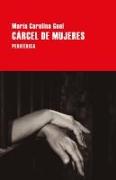On April 14, 1955, at the luxurious Crillon hotel in Santiago, Chile, the writer María Carolina Geel shot her lover several times and killed him instantly. The reasons were never known (there were those who said it was out of jealousy; others, an extravagant way to gain notoriety). The crime was notorious at the time and earned Geel three years in prison. From his stay in prison (and as has happened so many times in the history of literature, from Cervantes to Sade, Wilde or Genet), Geel obtained a perfect opportunity to write, a gesture already transgressive, since it combined the writing of crime and the crime of writing. Beyond guilt or atonement, Geel describes and reflects on the female prison universe, an impassable and dark world, in a work ahead of its time that mixes fiction, testimony and autobiography, and which was most groundbreaking. when talking about crimes, life in prison and desire between women. For this reason, this book occupies, in its own right, a unique place in Chilean literature.


